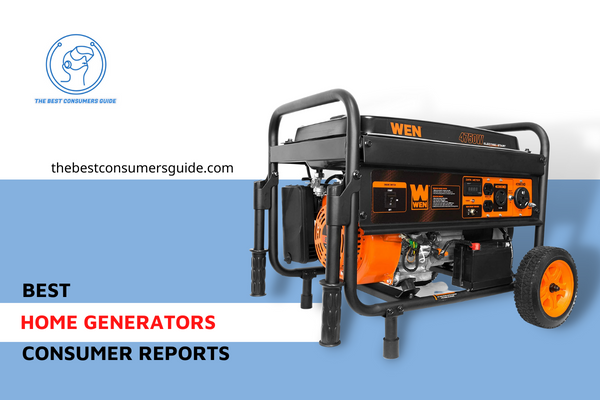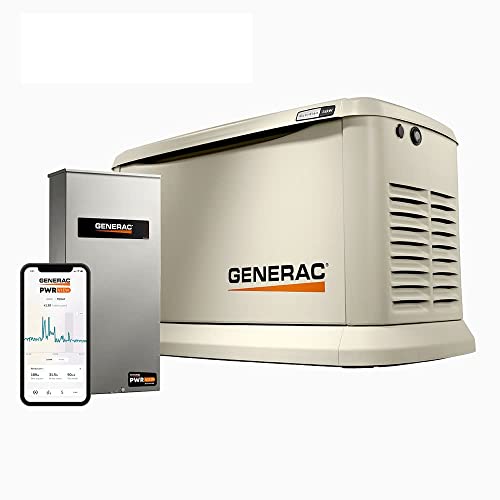Best Home Generators Consumer Reports, Ratings, Reviews, Tips, and Guides in 2023
Every household should have a home generator. A good generator will keep your family safe and comfortable during a power outage. But with so many different generators on the market, it can be hard to know which one is right for you. That’s where Consumer Reports comes in. Our experts have tested all of the latest generators and compiled their findings into this comprehensive guide. So whether you’re looking for a standby generator or a portable model, we’ve got you covered. Keep reading to learn more!

Top 10 Best Home Generatorsto Buy in 2023:
Below is the list of top 10 Best Home Generators that you can have a look at and buy. Check one by one carefully before purchasing.
*Note: Score is based on our AI score (Editor’s choice and rating)
What is Home Generators?
A home generator is a device that provides backup power during a power outage. Generators can run on either gasoline or propane, and they come in a variety of sizes to suit different homes and needs. Standby generators are the largest and most expensive type of home generator, but they’re also the most reliable. They’re typically installed outside the home and wired directly into the electrical system, so they kick on automatically in the event of a power outage.
Portable generators are smaller and less expensive, but they’re not as reliable as standby models. They also require more maintenance, since you’ll need to regularly change the oil and spark plugs.
What Are the Different Types of Home Generators?
When it comes to home generators, there are many different types available on the market. Some of the most common include standby generators, portable generators, and inverter generators.
Standby generators are typically installed as part of a permanent home power system. These units are connected directly to your home’s electrical panel and provide reliable backup power during an outage.
Portable generators are another popular option, as they can be easily moved and set up wherever you need power. These units typically use gasoline or propane fuel sources, and can provide enough power to run most essential appliances in your home during an emergency.
Finally, inverter generators are a newer type of generator that are designed to be quieter, more efficient, and safer than traditional models. These units use advanced technology and digital control systems to produce clean, consistent power that is safe for sensitive electronics like laptops, smartphones, and home theater systems.
How does Home Generators work?
Home generators work by converting mechanical energy into electrical energy. The engine runs on either gasoline or propane, and it turns a alternator to generate power. The electricity is then sent through wires to outlets in your home, where you can plug in appliances and other devices.
There are a few different types of home generators, but the most common type is the standby generator. Standby generators are permanently installed outside your home, and they kick on automatically when the power goes out.
Portable generators are another option, but they require more work to set up and they’re not as reliable as standby generators.
What Are the Benefits of Home Generators?
There are many benefits of owning a home generator. First and foremost, generators provide peace of mind in the event of a power outage. They can also keep your family comfortable by powering essential appliances like the refrigerator and air conditioner. Additionally, generators can run for days or even weeks at a time, so you don’t have to worry about losing perishable food or being without power for an extended period of time.
Pros and Cons of Home Generators
Pros
1. Generators can provide power during a power outage.
If you live in an area that is prone to power outages, a generator can be a lifesaver. Generators can keep your lights on and your refrigerator running during a power outage.
2. Generators can be used to power certain appliances or electronics while you’re away from home.
If you’re going to be away from home for an extended period of time, you can use a generator to power your refrigerator, freezer, or other appliances. This can be a great way to save money on your electric bill.
3. Generators can be used for camping or tailgating.
If you enjoy camping or tailgating, a generator can be a great way to power your RV or camper. Generators can also be used to power lights and other electronics at a tailgate party.
Cons
1. Generators can be expensive.
The upfront cost of a generator can be expensive. You’ll also need to factor in the cost of fuel and maintenance.
2. Generators can be loud.
If you’re using a generator to power your home, the noise can be disruptive. If you’re using a generator for camping or tailgating, the noise can be a nuisance to your neighbors.
3. Generators can produce harmful emissions.
If you’re using a gasoline-powered generator, it will emit carbon monoxide and other harmful emissions. These emissions can be dangerous to your health and the environment.
4. Generators require regular maintenance.
Generators require regular maintenance, such as changing the oil and filters. If you don’t perform regular maintenance, your generator could break down when you need it the most.
5. Generators can be dangerous.
If you don’t use your generator properly, it can be dangerous. Improper use can result in fires, carbon monoxide poisoning, or electrocution.
How to Use Home Generators?
Home generators are a great way to keep your home powered in the event of a power outage. But, they can also be dangerous if used improperly. Here are some tips on how to use your home generator safely:
-Before using your generator, read the manufacturer’s instructions carefully.
-Make sure to place your generator in a well-ventilated area, away from your home’s living quarters.
-Never operate your generator inside your home, garage, or any enclosed space.
-Connect your generator to your home’s electrical system only through a properly installed transfer switch.
-Be sure to disconnect all appliances and electrical equipment from your home’s main electrical supply before starting your generator.
-Never refuel your generator while it is running.
-Make sure to let your generator cool down before storing it.
-Check your generator’s oil level regularly, and change the oil according to the manufacturer’s recommendations.
By following these simple tips, you can help ensure that your generator is used safely and effectively.
Factors to Consider Before Buying Home Generators?
Size: The size of the generator you need depends on the wattage of the appliances and devices you want to power. Be sure to calculate the wattage of everything you want to run before deciding on a model.
Fuel type: Generators can run on either gasoline or propane. Gasoline is more readily available, but it can go bad if it’s not used regularly. Propane is more expensive, but it has a longer shelf life and can be stored indefinitely.
Runtime: Some generators can run for hours or even days at a time, while others need to be refueled more frequently. Consider how long you’ll need the generator to run before deciding on a model.
Noise level: Generators can be quite noisy, so be sure to consider the noise level before making a purchase. Some models are designed to be more quiet than others.
Ease of use: Portable generators can be tricky to set up, so be sure to choose a model that’s easy to use. Standby generators are more expensive, but they’re also much easier to install and use.
Brand: There are many different brands of generators on the market, so be sure to do your research before making a purchase. Read online reviews and compare prices to get the best value for your money.
Price: Home generators can range in price from a few hundred dollars to several thousand. Be sure to set a budget before you start shopping so you don’t overspend.
Design: Some generators are designed to be more aesthetically pleasing than others. If you’re concerned about the way your generator will look, be sure to choose a model with a design that you like.
Style: There are two main types of home generators: portable and standby. Portable generators are less expensive and can be moved around, but they’re not as reliable as standby models. Standby generators are more expensive, but they’re also much easier to use and maintain.
Material: The material of the generator is also an important factor to consider. Some generators are made with cheaper materials that may not be as durable, while others are made with more expensive and durable materials. Consider what type of material you want your generator to be made out of before making a purchase.
Portability: Portable generators can be moved from one location to another, but they’re not as easy to set up or use as standby models. If you need a generator that you can take with you, be sure to choose a portable model.
Reliability: Standby generators are the most reliable type of home generator, but they’re also the most expensive. Portable generators are less reliable and require more maintenance, but they’re less expensive and can be moved around if necessary.
Maintenance: Portable generators require more maintenance than standby models, since you’ll need to regularly change the oil and spark plugs. Standby generators are easier to maintain, but they’re more expensive. Choose the type of generator that best fits your needs and budget.
Warranty: Home generators come with a variety of different warranties. Be sure to read the warranty before making a purchase to make sure you’re covered in case of any problems.
Customer Service: If you have any questions or problems with your generator, be sure to contact the manufacturer’s customer service department. They should be able to help you troubleshoot any issues you’re having.
Budget: Home generators can range in price from a few hundred dollars to several thousand. Be sure to set a budget before you start shopping so you don’t overspend.
Common Mistakes When Using Home Generators?
There are a few common mistakes that people often make when using home generators. The most important is failing to maintain the generator properly and keeping it clean. This includes ensuring that all parts, filters, cables, and fuel lines are working properly.
Another common mistake is not understanding how to safely connect your appliances to the generator. It is important to always use the right type of cable and adapters, and to disconnect your appliances from the regular power source before plugging them into the generator.
Another mistake that people often make is not taking proper safety precautions when using a generator. This includes keeping children and pets away from the unit, being careful with flammable fuels or fluids, and staying alert for any signs of overheating or gas leaks.
To avoid mistakes and stay safe when using a home generator, it is essential to understand how the unit works and follow all maintenance and safety guidelines provided by the manufacturer.
Maintenance and Safety Tips for Home Generators
If you have a home generator, it’s important to keep up with regular maintenance and safety checks. This will help ensure that your generator is always in good working condition and that it won’t pose any hazards to your home or family.
Here are some maintenance and safety tips for home generators:
– Always follow the manufacturer’s recommended maintenance schedule. This will help keep your generator in good working condition and prevent any potential problems.
– Regularly check the engine oil level and change the oil as needed. This will keep the engine lubricated and running smoothly.
– Inspect the fuel system regularly for leaks or damage. This includes checking the fuel lines, fuel tank, and fuel filter. If you notice any problems, have them repaired as soon as possible.
– Check all of the electrical connections on your generator regularly. Make sure that all wiring is secure and free of any damage.
– Always operate your generator in a well-ventilated area. This will help prevent carbon monoxide build-up in your home.
By following these maintenance and safety tips, you can help ensure that your home generator is always safe to use.
FAQs about Home Generators:
What is the difference between a portable and standby generator?
Portable generators are less expensive and can be moved around, but they’re not as reliable as standby models. Standby generators are more expensive, but they’re also much easier to use and maintain.
How long will a generator last?
The lifespan of a generator depends on many factors, including how often it’s used and how well it’s maintained. Most generators will last for several years with proper care.
How much does a home generator cost?
Home generators can range in price from a few hundred dollars to several thousand. Be sure to set a budget before you start shopping so you don’t overspend.
What are the different types of home generators?
There are two main types of home generators: portable and standby. Portable generators are less expensive and can be moved around, but they’re not as reliable as standby models. Standby generators are more expensive, but they’re also much easier to use and maintain.
What should I look for when buying a home generator?
There are a few things to consider when buying a home generator, including your budget, the size of your home, and your power needs. Be sure to do some research before making a purchase to find the best option for you.
How often should you run a whole house generator?
It is recommended that you run your generator for at least two hours once a week to keep it in good working condition. If you live in an area with frequent power outages, you may need to use it more often.
How long can you power a house with a generator?
The amount of time you can power your house with a generator depends on the size of the generator and the amount of power you use. A small generator may only be able to power a few lights and appliances for a few hours, while a larger generator could power your entire house for days or weeks.
Can generators be left outside in the rain?
Yes, generators can be left outside in the rain. However, you should cover them with a tarp or another type of weather protection to keep them dry.
Can a generator power a fridge?
Yes, a generator can power a fridge. Many modern generators are designed to provide consistent and reliable power for a variety of household appliances and devices, including refrigerators. This means that you should be able to easily connect your fridge to the generator and keep it running smoothly during an outage or emergency situation. However, it is important to choose the right type of generator for your specific needs and to follow all safety and maintenance guidelines provided by the manufacturer.
Additionally, you may want to consider purchasing a surge protector or uninterruptible power supply for your fridge in order to help protect it from electrical surges or spikes that can damage sensitive electronics.
Can a generator power a TV?
Yes, a generator can power a TV. Most modern generators are designed to provide consistent and reliable power for a variety of household appliances and electronics, including TVs. This means that you should be able to easily connect your TV to your generator and enjoy uninterrupted viewing during an outage. However, it is important to choose the right type of generator for your needs and to follow all safety and maintenance guidelines provided by the manufacturer.
Additionally, you may want to consider purchasing a surge protector or uninterruptible power supply for your TV to help protect it from electrical surges or spikes that can damage sensitive electronics.
Conclusion
If you are in the market for a home generator, it is important to do your research first. Consumer Reports has compiled a list of the best generators on the market based on their extensive testing. Buying a generator can be an expensive investment, so it is important to make sure you get the right one for your needs. Reviewing all of the information available will help you make an informed decision and avoid buyer’s remorse down the road. Have you decided which generator is best for you?
I’m Georgie Barton, a reviewer for various magazines and consumer reports. I’ve been testing and writing about household products and electronics for years, and have become quite the authority on the subject. My goal is to help people make informed decisions when purchasing these items, so they can get the most value for their money.
My hope is that through my work, everyone will be able to find a quality and satisfactory product. Thank you for reading!










